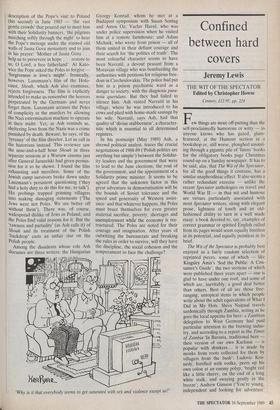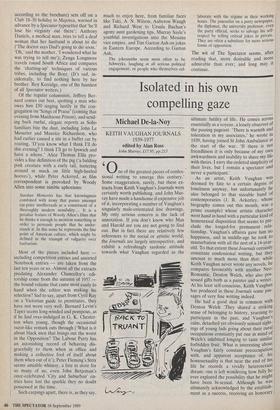Confined between hard covers
Jeremy Lewis
THE WIT OF THE SPECTATOR Edited by Christopher Howse Century, £12.95, pp. 224 Few things are more off-putting than the self-proclaimedly humorous or witty — as anyone knows who has gazed, glum- featured, at the Humour section in a bookshop or, still worse, ploughed unsmil- ing through a gigantic pile of 'funny' books for the obligatory books page Christmas round-up on a Sunday newspaper. It has to be said, alas, that The Wit of the Spectator, for all the good things it contains, has a similar anaphrodisiac effect. It also seems a rather redundant exercise — unlike the recent Spectator anthologies on travel and World War II — in that wit and humour are virtues particularly associated with most Spectator writers, along with elegant prose, lightness of touch and an old- fashioned ability to turn in a well made essay: a book devoted to, say, examples of correct grammar or spirited English culled from its pages would seem equally limitless in its potential, and equally pointless in its brief.
The Wit of the Spectator is probably best enjoyed as a fairly random selection of reprinted pieces, some of which — like Kingsley Amis's 'Sod the Public: A Con- sumer's Guide', the two sections of which were published three years apart — one is glad to have under one roof, and some of which are, inevitably, a good deal better than others. Best of all are those free- ranging, untopical items in which people write about the adult equivalents of What I Did in My Hols. Shiva Naipaul travels sardonically through Zambia, noting as he goes the local appetite for beer: a Zambian delegation to West Germany had paid particular attention to the brewing indus- try, and according to a report in the Times of Zambia 'In Bavaria, traditional beer — their version of our own Kachasu — is popular with drinkers.., it is made by monks from roots collected for them by villagers from the bush'; Ludovic Ken- nedy, fortified with vodka, peers up his own colon at an enemy polyp, 'bright red like a little cherry, on the end of a long white stalk, and swaying gently in the breeze'; Andrew Gimson (`You're young, independent and looking for adventure' according to the brochure) sets off on a Club 18-30 holiday in Majorca, warned in advance by a Spectator typesetter that 'he'll lose his virginity out there'; Anthony Daniels, a medical man, tries to tell a deaf woman that her husband is about to die (`The doctor says Dad's going to die soon.' 'Oh,' said the mother, 'I wondered what he was trying to tell me'); Zenga Longmore travels round South Africa and compares the 'chatting-up' techniques of various tribes, including the Boer. (It's sad, in- cidentally, to find nothing here by her brother. Roy Kerridge, one of the funniest of all Spectator writers.)
Of the regular columnists, Jeffrey Ber- nard comes out best, spotting a man who owes him £50 singing lustily in the con- gregation on 'Songs of Praise' (coming that evening from Maidstone Prison), and send- ing back rueful, elegaic reports as Soho familiars bite the dust, including John Le Mesurier and Maurice Richardson, who had earlier caused a stir in a buffet car by roaring, `D'you know what I think I'll do this evening? I think I'll go to Ipswich and have a whore.' Alice Thomas Ellis pro- vides a fine definition of the pig Ca balding pink creature with a curly tail, teetering around in muck on little high-heeled hooves'), while Peter Ackroyd, as film correspondent is provoked by Woody Allen into some nimble aphorisms:
Stardust Memories has that knowingness combined with irony that passes amongst cut-price intellectuals as a constituent of a thoroughly modern sensibility... It is a peculiar feature of Woody Allen's films that he thinks it enough to mention something in order to persuade people that he under- stands it. In this sense he represents the fine point of American culture, which might be defined as the triumph of vulgarity over barbarism.
Most of the pieces included here — including competition entries and assorted Notebook entries — are taken from the last ten years or so. Almost all the extracts predating Alexander Chancellor's edi- torship come from the autumn of 1957 — the bound volume that came most easily to hand when the editor was making his selection? Sad to say, apart from Cyril Ray on a Victorian guide to prostitutes, they have not worn very well. Bernard Levin's Taper seems long-winded and pompous, as if he had over-indulged in G. K. Chester- ton when young, though the occasional razor-like remark cuts through (What is it about black men that brings out the worst in the Opposition? The Labour Party has an astonishing record of behaving dis- gracefully to them when in office and making a collective fool of itself about them when out of it'); Peter Fleming's Strix seems amiable whimsy, a fate in store for so many of us; even John Betjeman's once-celebrated 'City and Suburban' en- tries have lost the sparkle they no doubt possessed at the time.
Such carpings apart, there is, as they say, much to enjoy here, from familiar faces like Taki, A. N. Wilson, Auberon Waugh and Richard West to Ursula Buchan's agony aunt gardening tips, Murray Sayle's youthful investigations into the Messina vice empire, and Tim Garton Ash on jokes in Eastern Europe. According to Garton Ash,
The jokesmiths seem most often to be Schweyks, laughing at all serious political engagement, or people who themselves col- laborate with the regime in their working hours. The journalist on a party newspaper, the diplomat, the university professor, even the party official, seeks to salvage his self- respect by telling critical jokes in private. They are often a substitute for more serious forms of opposition.
The wit of The Spectator seems, after reading that, more desirable and more admirable than ever; and long may it continue.



































































 Previous page
Previous page